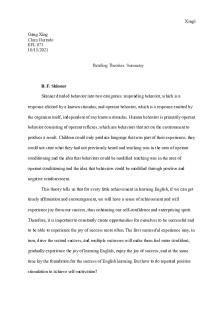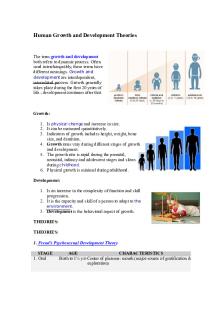Human Growth Summary of Theories PDF

| Title | Human Growth Summary of Theories |
|---|---|
| Author | Laura Trythall |
| Course | Human Growth and Development |
| Institution | Birmingham City University |
| Pages | 3 |
| File Size | 45 KB |
| File Type | |
| Total Downloads | 2 |
| Total Views | 124 |
Summary
Summary of main human growth and development theories using a case study...
Description
Human Growth and Development Theories Let's consider the following scenario: Three-year-old Timmy has started making his own breakfast of cereal each morning. Cereal often ends up on the kitchen floor, and he regularly spills the milk when he's pouring it into the bowl. When his mother tries to make his cereal for him, Timmy becomes angry and shouts at her, 'No! I can do it!' Why is Timmy behaving this way? Has Timmy learned this behavior, or are his actions related to his age, family relationships, or personality? Questions like these are what developmental psychologists try to answer. They seek to understand and explain the behavior that occurs throughout our lives. A number of different theories have been developed in an attempt to explain the various aspects of human growth. Developmental theories provide a set of guiding principles and concepts that describe and explain human development. By better understanding how and why people change and grow, we can help this growth take place in positive ways. Psychoanalytic Theories One of the most influential theories of human development is psychoanalytic theory. Many modern theories of counseling or psychotherapy are extensions, modifications, or reactions against psychoanalytic theory. Psychoanalytic theory examines the factors that motivate behavior by focusing on the role of the unconscious. Sigmund Freud and Erik Erikson are examples of theorists who support this approach. Freud was a pioneer with his psychoanalytic theory of personality and his psychosexual development theory. Erikson expanded Freud's theories in many ways and developed his own theory of psychosocial development. Psychoanalytic theory's strength lies in its awareness of unconscious motivation and the importance of early experiences on development. Unfortunately, the ideas involved are difficult to test. Because of this, psychoanalytic theory does not have substantial research available to support its ideas. Remember Timmy? Psychoanalytic theory might explain his behavior by saying that he's seeking independence and that he's acting in an age-appropriate way for the developmental stage that he is experiencing. Learning Theories As a reaction to the lack of empirical evidence to support the claims of psychoanalytic theory, psychologists became increasingly interested in developing a more scientific approach. In order to do this, some researchers began to study only those things that could be measured and quantified. This led to the emergence of learning theories. Learning theories focus on how behavior is learned. Let's look at some individuals who developed theories that focus on how people learn new behaviors. Ivan Pavlov studied learning through association in his theory of classical conditioning. B.F. Skinner examined the effects of reinforcement and punishment in his theory of operant conditioning. Albert Bandura considered the effects of behavior modeling in his social learning theory. The major strength of behavioral learning theories is their ability to be tested and to be practically applied. The main weakness of these theories is that they generally ignore the effect of the genetic processes and changes that occur throughout the human lifespan. Think back to Timmy's behavior again. Learning theory might explain his actions as a learned response. Timmy knows that if he tries to make his own cereal when his mother is around, she will try to help him. If he acts out when she does this, he gets the that attention he is seeking. His mother's attention reinforces the response, and he learns to repeat the acting-out behavior to gain her attention.
Cognitive Development Theories Another way to look at human development is through cognitive development theories. Cognitive development theories are concerned with the development of thought processes and how these thought processes influence our understanding of the world around us. A major figure in cognitive development theory is Jean Piaget. He revolutionized the way we look at child development by proposing the idea that children think differently than adults. Piaget's stages of cognitive development look at the sequential steps that take place in children's intellectual development. Cognitive behavioral theories are supported by research and are influential in parenting and in the field of education. However, a weakness of the theory is the limited consideration of emotional factors. Remember Timmy? A cognitive theorist might explain Timmy's behavior as a learning process. Timmy is developing a better understanding of shapes and logic, but his worldview is still egocentric. Timmy's attempts to make his own cereal show both the development of an understanding of how to perform the task and also a self-centered desire to do it without assistance. Systems Theories Human development can also be examined as a product of the interaction of complex systems that influence an individual. Theories that support this view are known as systems theories. Systems theories look at how people interact with their environment and how these interactions relate to biological factors and behavior. There are several approaches to developmental systems theory. Evolutionary developmental psychology is the application of Charles Darwin's theory of evolution and natural selection to the process of human development. Gilbert Gottlieb is an important figure in epigenetic psychobiological systems perspective, which views development as a product of interaction between biological and environmental forces. Ecological systems theory was developed by Urie Bronfenbrenner. This theory divides the environment into different systems that interact to influence the development of an individual in some way. Systems theory's main strength is its emphasis on the interaction of many different factors in determining development. This is also its main weakness because the complex interactions taking place are difficult to test scientifically. Let's think about Timmy again. Systems theory might explain his behavior as being an effect of the interactions in his environment. Timmy's father travels often because of his work. This causes Timmy to seek attention at home when his father is away because he is anxious. Attempting to make his own breakfast is one way that Timmy can seek the attention that he desires when his father is sent away on a business trip. Lesson Summary Perhaps now Timmy's mom can understand better the possible reasons for Timmy's behavior. She has learned that there are a number of different ways to think about his actions. The best fit for the situation could be a psychoanalytic theory, a learning theory, a cognitive development theory, or a systems theory. Each developmental theory provides a set of guiding principles and concepts that describe human development. Timmy's mother may choose a different way to deal with the situation, depending on which theory she thinks is the best fit. The purpose of using a developmental theory to help her is to help Timmy's growth take place in a positive way. Lesson Outcome Upon finishing this lesson, you should be able to understand and describe different human development
theories and explain their strengths and weaknesses, including: Psychoanalytic theory (Freud and Erikson) Learning theory (Pavlov) Cognitive development theory (Piaget) Systems theory (Darwin, Gottlieb, and Bronfenbrenner)...
Similar Free PDFs

Human Growth Summary of Theories
- 3 Pages

Theories of Human Communication
- 493 Pages

Summary of nursing theories
- 19 Pages

Theories of Personality Summary
- 43 Pages
![[ Summary] Theories OF Personality](https://pdfedu.com/img/crop/172x258/1056yokdyg92.jpg)
[ Summary] Theories OF Personality
- 90 Pages
![[ Summary] Theories OF Personality](https://pdfedu.com/img/crop/172x258/nq5oe6wpwzlx.jpg)
[ Summary] Theories OF Personality
- 89 Pages

Human growth and development
- 46 Pages

Reading Theories Summary
- 4 Pages
Popular Institutions
- Tinajero National High School - Annex
- Politeknik Caltex Riau
- Yokohama City University
- SGT University
- University of Al-Qadisiyah
- Divine Word College of Vigan
- Techniek College Rotterdam
- Universidade de Santiago
- Universiti Teknologi MARA Cawangan Johor Kampus Pasir Gudang
- Poltekkes Kemenkes Yogyakarta
- Baguio City National High School
- Colegio san marcos
- preparatoria uno
- Centro de Bachillerato Tecnológico Industrial y de Servicios No. 107
- Dalian Maritime University
- Quang Trung Secondary School
- Colegio Tecnológico en Informática
- Corporación Regional de Educación Superior
- Grupo CEDVA
- Dar Al Uloom University
- Centro de Estudios Preuniversitarios de la Universidad Nacional de Ingeniería
- 上智大学
- Aakash International School, Nuna Majara
- San Felipe Neri Catholic School
- Kang Chiao International School - New Taipei City
- Misamis Occidental National High School
- Institución Educativa Escuela Normal Juan Ladrilleros
- Kolehiyo ng Pantukan
- Batanes State College
- Instituto Continental
- Sekolah Menengah Kejuruan Kesehatan Kaltara (Tarakan)
- Colegio de La Inmaculada Concepcion - Cebu







